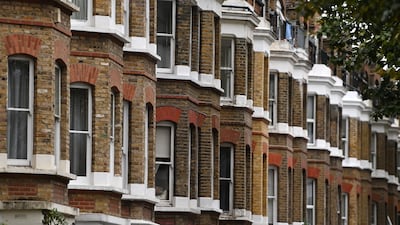House prices in the UK rose by 0.9 per cent in October compared with the previous month, according to the Nationwide Building Society.
The month-on-month rise in prices is being put down to a drop in the supply of properties coming on to the market.
The Nationwide's monthly house price index also showed prices were 3.3 per cent lower in October when compared with the same month last year.
The monthly increase mean that the annualised figure for October improved from the 5.3 per cent drop in September.
“Nevertheless, housing market activity has remained extremely weak, with just 43,300 mortgages approved for house purchase in September, around 30 per cent below the monthly average prevailing in 2019," said Robert Gardner, chief economist at Nationwide.
“This is not surprising as affordability remains stretched. Market interest rates, which underpin mortgage pricing, have moderated somewhat but they are still well above the lows prevailing in 2021.
“The uptick in house prices in October most likely reflects the fact that the supply of properties on the market is constrained.
"There is little sign of forced selling, which would exert downward pressure on prices, as labour market conditions are solid and mortgage arrears are at historically low levels."

'House prices won’t recover until 2025'
The average UK house price in October was £259,423 ($315,204), compared with £257,808 in September.
“A slight rise in house prices may not be enough to ward off predictions that house prices won’t recover until 2025, largely due to higher borrowing costs causing a slowdown in house sales," said James Briggs, head of intermediary sales at the mortgage company Together.
“Looking ahead to the next year, we expect to see the overall housing market heavily influenced by the exit of more amateur buy-to-let landlords, as they consider whether lower yields against higher mortgage costs are worth the time, upkeep, and potential repair costs on a reduced margin."
Most market watchers felt the October monthly rise was an odd blip in an otherwise gloomy market.
"October's uptick in prices has certainly come out of the blue based on what we're seeing," Bob Singh, founder of Chess Mortgages, told Newspage.
"Activity levels are down in all areas of the market, from first-time buyers and home movers to landlords.
"The purchase market is on ice as first-time buyers await even lower mortgage pricing and house prices before they jump on to the ladder."
Rate decision on Thursday
Attention now turns to the Bank of England, where the Monetary Policy Committee (MPC) will announce its latest decision on interest rates on Thursday.
Many economists expect the MPC to leave interest rates on hold at 5.25 per cent, as inflation falls and fears of a recession grow.
"While another pause delivers good news for first-time buyers buoyed by robust wage growth and easing mortgage rates, interest rates are now forecast to stay higher for longer to constrain demand, which could add further downward pressure on residential property prices," said Alice Haine, personal finance analyst at Bestinvest.


